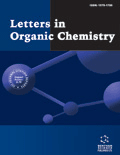
LETTERS IN ORGANIC CHEMISTRY
Scope & Guideline
Championing Vital Research in Organic Chemistry
Introduction
Aims and Scopes
- Innovative Synthetic Methodologies:
The journal showcases cutting-edge synthetic strategies, including one-pot reactions, multicomponent synthesis, and the use of novel catalysts, particularly those that are environmentally friendly. - Biological Activity and Medicinal Chemistry:
Research articles often include evaluations of synthesized compounds for their biological activity, particularly in the fields of antimicrobial, anticancer, and anti-inflammatory agents. - Green Chemistry Principles:
A consistent focus on sustainability is evident, with many papers highlighting green synthesis methods, such as solvent-free techniques and the use of renewable resources. - Computational Chemistry:
The journal frequently publishes articles that utilize computational methods, including molecular docking and DFT studies, to predict the behavior of compounds and their interactions at a molecular level. - Catalysis Research:
There is a significant emphasis on catalytic processes, especially those involving metal-free or biocatalytic approaches, addressing the need for efficient and sustainable reaction conditions.
Trending and Emerging
- Sustainable Chemistry and Green Synthesis:
There is a marked increase in publications related to green chemistry, including the use of renewable resources, solvent-free reactions, and eco-friendly catalysts, underscoring a collective movement towards sustainability in chemical practices. - Nanotechnology in Synthesis:
Research involving nanomaterials and their applications in catalysis and synthesis is on the rise, highlighting the growing interest in novel materials that enhance reaction efficiency and selectivity. - Multicomponent Reactions (MCRs):
The popularity of multicomponent reactions is increasing, as they offer efficient pathways for constructing complex molecules in fewer steps, making them appealing for both synthetic and industrial applications. - Biological Evaluation of Synthetic Compounds:
An increasing number of studies are focusing on the biological evaluation of newly synthesized compounds, particularly their potential as therapeutic agents, reflecting a strong trend towards integrating chemistry with pharmacology. - Use of Computational Methods in Synthesis:
There is a growing trend towards integrating computational methods, such as molecular docking and DFT calculations, into synthetic methodology studies, facilitating the design and optimization of new compounds.
Declining or Waning
- Traditional Synthesis Techniques:
There appears to be a decreasing trend in the publication of articles focused solely on traditional synthetic methods, as researchers increasingly favor innovative and sustainable approaches. - Inorganic Chemistry Applications:
Research related to purely inorganic synthesis or applications in organic chemistry seems to be less prominent, indicating a shift towards organic-centric methodologies and applications. - Narrowly Focused Antiviral Research:
Although antiviral research remains relevant, there is a noticeable decrease in articles exclusively addressing this topic, potentially due to the rapidly evolving nature of viral research and therapeutic strategies.
Similar Journals
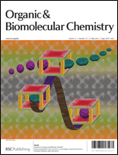
ORGANIC & BIOMOLECULAR CHEMISTRY
Unveiling the complexities of biochemistry and organic chemistry.ORGANIC & BIOMOLECULAR CHEMISTRY is a prestigious academic journal published by the Royal Society of Chemistry, dedicated to advancing the fields of organic and biomolecular chemistry. With its ISSN of 1477-0520 and E-ISSN of 1477-0539, this journal plays a pivotal role in disseminating high-quality research and contributing to the scientific community, particularly in biochemistry, organic chemistry, and physical and theoretical chemistry. Currently ranked in the third quartile for Biochemistry and the second quartile for Organic Chemistry and Physical and Theoretical Chemistry, it caters to a diverse audience of researchers, professionals, and students who seek insightful studies and reviews. With a publication history spanning since 2003 and ongoing till 2024, the journal fosters open access to its articles, encouraging the free exchange of knowledge. Situated in the vibrant academic environment of Cambridge, UK, ORGANIC & BIOMOLECULAR CHEMISTRY serves as a vital resource for innovative research at the intersection of chemical sciences.
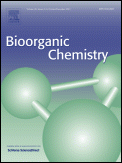
BIOORGANIC CHEMISTRY
Advancing the frontiers of biochemistry and organic chemistry.BIOORGANIC CHEMISTRY, published by Academic Press Inc., a prestigious imprint of Elsevier Science, represents a cornerstone in the fields of biochemistry, organic chemistry, and drug discovery. With an impressive Scopus rank placing it in the top quartiles across critical categories—including Q2 for Biochemistry and Drug Discovery, and Q1 for Organic Chemistry—this journal has established itself as a vital resource for researchers, professionals, and students alike. Featuring a diverse array of articles that explore innovative methodologies and emerging trends from 1971 to the present, BIOORGANIC CHEMISTRY effectively bridges the gap between laboratory research and practical applications. Although not an Open Access journal, its rigorous peer-review process ensures the delivery of high-quality, impactful research that drives advances in the understanding and application of biochemistry. With an aim to facilitate scientific discourse and collaboration, it invites contributions that further the exploration of chemical processes within biological systems.

CCS Chemistry
Connecting Researchers with Cutting-Edge Chemical InsightsCCS Chemistry, published by the esteemed Chinese Chemical Society, is a leading open-access journal dedicated to advancing the field of chemistry. Since its inception in 2019, the journal has rapidly gained recognition, achieving a remarkable impact factor that places it in the prestigious Q1 category in Chemistry (Miscellaneous) as of 2023. With a Scopus ranking of #41 out of 408 in General Chemistry, CCS Chemistry represents the top 10th percentile in its category, reflecting its commitment to high-quality research and innovation. The journal serves as a vital platform for researchers and professionals to share their findings, showcase cutting-edge methodologies, and engage with the latest developments in various chemistry subfields. Accessible to a global audience, CCS Chemistry ensures that groundbreaking research is available without barriers, making it an indispensable resource for students and academics aiming to stay at the forefront of chemical sciences. For further details, submissions, and access to published articles, please visit the journal's website.

Organic Communications
Exploring the depths of Organic Chemistry for a sustainable future.Organic Communications is an esteemed journal published by ACG PUBLICATIONS, dedicated to advancing the field of Organic Chemistry. Established in 2008 and continuing its journey into 2024, this scholarly journal provides a platform for the dissemination of high-impact research findings, reviews, and methodological advances that shape the landscape of organic chemistry. Located in Turkey, it has made notable strides with a current Scopus rank of #148 out of 211 within its category, placing it in the 30th percentile. As a Q3 journal in organic chemistry, it caters to a diverse readership of researchers, professionals, and students, offering insights that bridge theoretical research and practical applications. Although it does not operate under an open access model, Organic Communications is poised to contribute significantly to the academic community by enabling access to crucial research developments and fostering collaboration within the discipline.

JOURNAL OF HETEROCYCLIC CHEMISTRY
Navigating the World of Organic InnovationsJournal of Heterocyclic Chemistry, published by Wiley, stands as a key resource in the field of organic chemistry, offering in-depth research articles and insights spanning from 1966 to 2024. With its strong Scopus ranking of #83 out of 211 in the Organic Chemistry category, placing it in the 60th percentile, the journal maintains its significance and relevance within the academic community. Although it does not currently offer open access options, it provides extensive coverage of heterocyclic compounds, which are vital to various applications in pharmaceuticals and material sciences. The journal's commitment to high-quality research is further reflected in its classification as Q3 in the 2023 quartiles for Organic Chemistry. Researchers, professionals, and students alike will find valuable contributions to the intricate studies of heterocycles, enhancing their understanding and exploration of this fascinating area of chemistry.
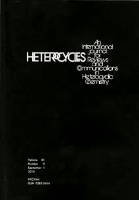
HETEROCYCLES
Catalyzing Progress in Pharmacology and ChemistryHETEROCYCLES, published by the Japan Institute of Heterocyclic Chemistry, stands as a pivotal journal within the fields of Analytical Chemistry, Organic Chemistry, and Pharmacology. With its ISSN 0385-5414 and E-ISSN 1881-0942, HETEROCYCLES has been a respected platform for scholarly work since its establishment in 1983, featuring innovative research up until 2022. While currently not open access, the journal is renowned for its rigorous peer-review process, ensuring the dissemination of high-quality research. Despite its Q4 ranking in the 2023 quartiles for its categories, it plays a crucial role in bridging gaps in knowledge and advancing the discourse on heterocyclic compounds, which are vital in drug discovery and development. Researchers, professionals, and students who are engaged in chemistry and pharmacology will find HETEROCYCLES an essential source of cutting-edge studies, insights, and an opportunity to contribute to the evolving landscape of these scientific fields.

Heterocyclic Letters
Fostering Excellence in Heterocyclic Compound StudiesHeterocyclic Letters is an esteemed journal in the field of synthetic organic chemistry, published by RAMAN PUBL. With ISSN 2231-3087 and E-ISSN 2230-9632, this journal aims to disseminate original research and innovative findings related to heterocyclic compounds, which play a crucial role in medicinal chemistry, material science, and agricultural chemistry. Heterocyclic Letters provides a platform for researchers, professionals, and students to share their insights and advancements, thus fostering academic collaboration and knowledge transfer. The journal is dedicated to maintaining high-quality standards in research publication, making it an essential resource for anyone focused on the latest developments in heterocyclic chemistry. Although it does not currently offer Open Access options, the journal’s rigorous peer-review process ensures that only the most credible and impactful studies are published, contributing significantly to the advancement of the field.
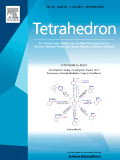
TETRAHEDRON
Catalyzing progress in biochemistry and organic chemistry.TETRAHEDRON, published by Pergamon-Elsevier Science Ltd, is a leading peer-reviewed journal that has been pivotal in advancing the fields of Biochemistry, Drug Discovery, and Organic Chemistry since its inception in 1957. With an ISSN of 0040-4020 and an E-ISSN of 1464-5416, this journal provides a platform for the dissemination of cutting-edge research and innovative methodologies that contribute significantly to the scientific community. Recognized for its rigorous editorial standards, TETRAHEDRON has been categorized in the Q3 quartile for 2023 across its relevant fields, reflecting its solid impact within the scientific sphere. Despite the current absence of Open Access options, the journal continues to engage a diverse readership, offering invaluable insights and advancements that fuel both academic and industrial applications. With an ongoing commitment to excellence, TETRAHEDRON remains an essential resource for researchers, professionals, and students aiming to stay at the forefront of chemistry and biochemistry research.
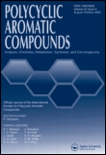
POLYCYCLIC AROMATIC COMPOUNDS
Illuminating the World of Polycyclic CompoundsPOLYCYCLIC AROMATIC COMPOUNDS, published by TAYLOR & FRANCIS LTD, is a pivotal journal dedicated to the study of polycyclic aromatic compounds, which play a significant role in fields spanning materials chemistry, organic chemistry, and polymers. With an ISSN of 1040-6638 and an E-ISSN of 1563-5333, this journal features a robust collection of research that informs and guides advancements in understanding the complex interactions and applications of these compounds. Having established its presence since 1990, POLYCYCLIC AROMATIC COMPOUNDS currently holds a Q3 ranking in multiple categories, including Materials Chemistry, Polymers and Plastics, and Organic Chemistry, showcasing its consistent contributions to scientific dialogues. Though traditionally not an open access journal, it provides immense value to researchers, professionals, and students seeking reliable and impactful studies. The journal is located in the United Kingdom at 2-4 PARK SQUARE, MILTON PARK, ABINGDON OR14 4RN, OXON, ENGLAND, and continues to be a trusted source for cutting-edge research in the field.
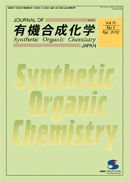
JOURNAL OF SYNTHETIC ORGANIC CHEMISTRY JAPAN
Advancing the frontiers of synthetic organic chemistry.JOURNAL OF SYNTHETIC ORGANIC CHEMISTRY JAPAN, published by the SOCIETY OF SYNTHETIC ORGANIC CHEMISTRY, JAPAN, is an esteemed publication specializing in the dynamic field of organic chemistry. With a rich history dating back to 1944, this journal aims to disseminate pivotal research findings and innovative methodologies in synthetic organic chemistry, fostering collaboration and knowledge exchange among researchers and professionals. Although it currently holds a modest ranking in the Q4 quartile for organic chemistry, its commitment to advancing the discipline remains steadfast. The journal primarily caters to scholars and students seeking to delve deeper into organic synthesis, highlighting original articles, reviews, and methodological studies. While access to the journal is not open, its contributions to the field are essential for anyone invested in understanding the complexities of organic chemistry. We invite you to explore the journal's offerings and enhance your expertise in synthetic organic processes.